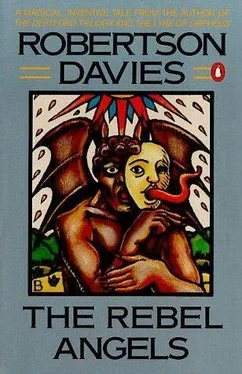Robertson Davies - The Rebel Angels
Здесь есть возможность читать онлайн «Robertson Davies - The Rebel Angels» весь текст электронной книги совершенно бесплатно (целиком полную версию без сокращений). В некоторых случаях можно слушать аудио, скачать через торрент в формате fb2 и присутствует краткое содержание. Жанр: Триллер, на английском языке. Описание произведения, (предисловие) а так же отзывы посетителей доступны на портале библиотеки ЛибКат.
- Название:The Rebel Angels
- Автор:
- Жанр:
- Год:неизвестен
- ISBN:нет данных
- Рейтинг книги:5 / 5. Голосов: 1
-
Избранное:Добавить в избранное
- Отзывы:
-
Ваша оценка:
- 100
- 1
- 2
- 3
- 4
- 5
The Rebel Angels: краткое содержание, описание и аннотация
Предлагаем к чтению аннотацию, описание, краткое содержание или предисловие (зависит от того, что написал сам автор книги «The Rebel Angels»). Если вы не нашли необходимую информацию о книге — напишите в комментариях, мы постараемся отыскать её.
The Rebel Angels — читать онлайн бесплатно полную книгу (весь текст) целиком
Ниже представлен текст книги, разбитый по страницам. Система сохранения места последней прочитанной страницы, позволяет с удобством читать онлайн бесплатно книгу «The Rebel Angels», без необходимости каждый раз заново искать на чём Вы остановились. Поставьте закладку, и сможете в любой момент перейти на страницу, на которой закончили чтение.
Интервал:
Закладка:
There were treasures, too, and nobody knew about them except myself, because I would not permit the librarians to snoop. There were letters from painters who had subsequently become celebrated, but who wrote to Cornish when they were young and poor, letters of friendship and often of touching need. They illustrated their letters with sketches and scribbles that were funny and delightful, and sometimes of beauty. When I explained all of this to Arthur Cornish, he said: "I leave it up to you; Uncle Frank trusted you and that's quite good enough for me." Which was complimentary but unhelpful, because the librarians were tough.
The National Library's case was that Cornish had been a Great Canadian (how he would have laughed, for he had as little vanity as any man I ever knew) and everything about him that could be preserved should be given the archival treatment, catalogued, cross-indexed, and preserved in acid-free containers so that it would never perish. But the University Library saw Cornish as a great benefactor of the University who had shown his esteem for its Library by leaving it a splendid collection of fine books and manuscripts; his memory should repose, so far as possible, in their hands.
Why? I asked. Were not the treasures themselves sufficient without all the rubbish, much of which seemed to me to be good for nothing but the incinerator? No, said the archivists, in controlled voices beneath which I could hear suppressed shrieks of rage and horror at my ignorance and obtuseness. Surely I was not forgetting Research, that giant scholarly industry? Students of art, students of history, students of God knows what else, would want to know everything about Cornish that could be recovered. How did I expect that the official biography of Cornish could be written if all his papers were not in responsible hands, forever?
I was not impressed. I have read two or three official lives of people I have known well, and they never seemed to be about the person I knew. They were, upon the whole, cautiously favourable to their subjects, though they did not neglect what the writers loved to call Flaws. It is part of the received doctrine of modern biography that all characters are Flawed, and as a Christian priest I am quite ready to agree, but the Flaws the biographers exhibited usually meant that the person under discussion had not seen eye to eye with the biographer on matters of politics, or social betterment, or something impersonal. What I thought of as human flaws – Pride, Wrath, Envy, Lust, Gluttony, Avarice, and Sloth, the Deadly Seven, of which Cornish had scored pretty high on the latter four – rarely received any intelligent discussion. As for the Virtues – Faith, Hope, Charity, Prudence, Justice, Fortitude, and Temperance, some of which Cornish had possessed in praiseworthy plenty – biographers never wanted to talk about them under their own names, or even under fashionable modern names. There had been no Love in the biographies of any people I had known personally, and perhaps it was impudent of me to wish that Cornish, if he were to be the subject of a Life, might have a proper measure of Love. Or Hate, or anything but the scholarly incomprehension of a professional biographer.
So I havered and temporized between the two claimants, and lost sleep, and sometimes wished I had the courage to do what I had a right to do, and put the whole mess in a fire. But those wonderful letters from the artists made me stay my hand.
What was all Cornish's hoard of objects worth? Arthur Cornish had the easy job of dealing with the money, which could be reckoned up in terms tax-collectors and probate courts understood. The objects of art were quite another thing; the tax people wanted a sum to put here and there on pieces of paper which were important to them, if to nobody else. We could not appeal to insurance records; Cornish never insured anything. Why insure what is irreplaceable? I persuaded Hollier and McVarish, without difficulty, to let me call in the Toronto branch of Sotheby's to make a valuation. But here again we ran into trouble. The valuers knew their stuff, and could tell us what the hoard might fetch, piece by piece, at auction if it were all catalogued and offered in the right markets. A probate value was something different, because Arthur Cornish was firm in his determination not to have estate duties reckoned on present inflated values for objects of art. The fact that so much of the stuff was left to the public, in one way or another, did not make as much difference as Arthur thought it should.
It was weary work, and kept me from what I was paid by the university to do.
2
The principal excuse for my life, I suppose, is that I am a good teacher. But to teach my best I must have some peace of mind, because I do not simply dole out lectures I prepared long ago; I engage my classes, which are never large, in talk and discussion; every year the shape of the work is different, and the result is different, because as much depends on the quality of the students as depends on me. Cornish's posthumous demands cost me too much in worry for me to teach at my best level.
I was particularly anxious to do so, because for the first time in some years I had an exceptional student, none other than the Maria Magdalena Theotoky whose presence I had taken note of at Cornish's funeral. I asked her if she knew him, and she said no, but that Professor Hollier had said she might find herself greatly obliged to Cornish some day, and suggested that she attend. She seemed to be a special pet of Hollier's, and that surprised me because he was not a man to have much to do with his students outside the classroom. I suppose that, like myself, he was drawn by her real scholarly appetite; she appeared to want knowledge for itself, and not because it could lead to a career. Theologically trained as I was, I wondered if she were one of the Scholarly Elect; I mean it as a joke, but only partly as a joke. As Calvin said that mankind was divided between the Elect, chosen to be saved, and the Reprobate Remainder of mankind, so it seemed to me to be with knowledge; there were those who were born to it, and those who struggled to acquire it. With the Scholarly Elect one seems not so much to be teaching them as reminding them of something they already know; that was how it was with Maria, and she fascinated me.
Of course she was better prepared for New Testament Greek than students usually are; she knew Classical Greek well, and instead of treating the N.T. stuff as a degenerate language she saw it for what it was, a splendid ruin, like a Greek statue with the nose knocked off, the arms gone, the privy parts lost, but Greek nevertheless, and splendid in decay. A language, furthermore, that had been serviceable to St. Paul and the Four Evangelists, and capable of saying mighty things.
Why was she bothering with it? She said something about her studies in Rabelais, who knew Greek as both a priest and a humanist, at a time when the Church did not encourage Greek studies. Funny about that, I told the seminar; during the Renaissance it was people outside the universities who really dug into the rediscovered classics; even Archimedes, who put forward no disturbing ideas, like Plato, but propounded some scientific discoveries and the theory of the endless screw, was not studied by the academicians. This brought a laugh from my two ultramodern students who had been nurtured in our permissive age, and who probably thought that the endless screw, in their own interpretation of the words, might be a path to enlightenment. But Maria knew what I was really talking about, which is that universities cannot be more universal than the people who teach, and the people who learn, within their walls. Those who can get beyond the fashionable learning of their day are few, and it looked as if she might be one of them. I believed myself to be a teacher who could guide her.
Читать дальшеИнтервал:
Закладка:
Похожие книги на «The Rebel Angels»
Представляем Вашему вниманию похожие книги на «The Rebel Angels» списком для выбора. Мы отобрали схожую по названию и смыслу литературу в надежде предоставить читателям больше вариантов отыскать новые, интересные, ещё непрочитанные произведения.
Обсуждение, отзывы о книге «The Rebel Angels» и просто собственные мнения читателей. Оставьте ваши комментарии, напишите, что Вы думаете о произведении, его смысле или главных героях. Укажите что конкретно понравилось, а что нет, и почему Вы так считаете.












